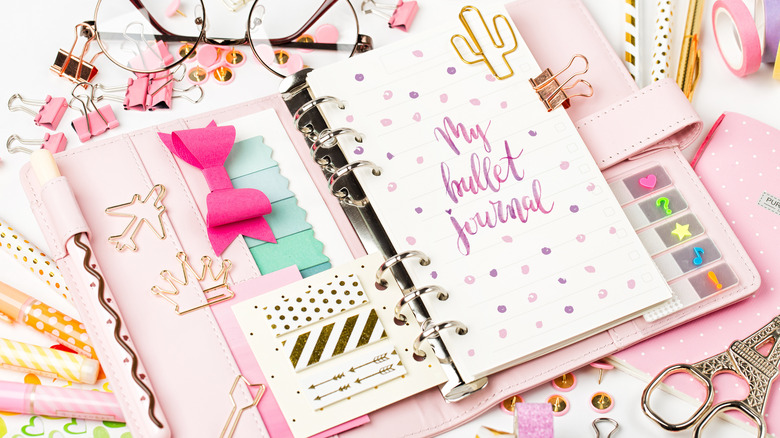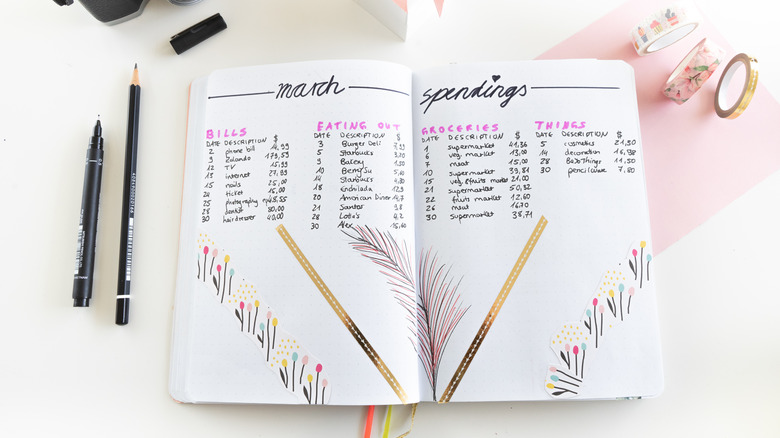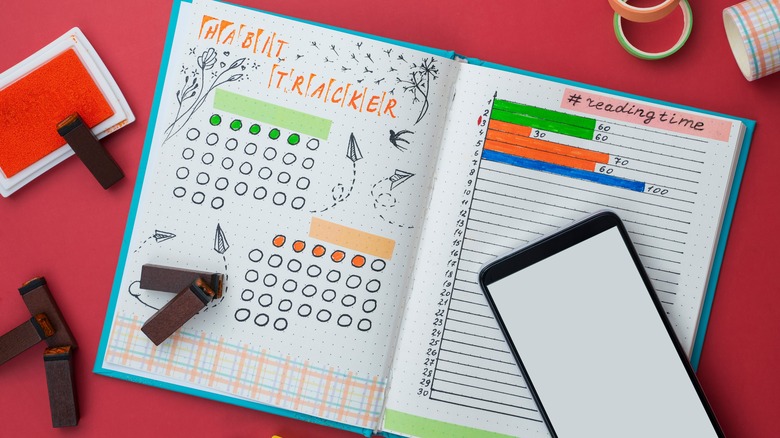Feeling Disorganized? Here's How Bullet Journaling Can Help
If you feel like your life lacks a little structure or want to be more disciplined with how you spend your days, a bullet journal might be a perfect one-stop shop for your organizational needs. According to Oprah Daily, this stationery product mixes in aspects of a diary, a journal, and a to-do list. While the written aspect of the bullet journal makes it highly effective, it's not just about writing. There are also areas to use your drawing skills and keep track of your calendar by adding daily, weekly, or monthly tasks. While the process of creating a bullet journal can be therapeutic in itself, it's also a great way to log your mental, emotional, and physical health.
If you have always slightly envied people who seem to have every aspect of their life organized, starting a bullet journal will make you feel like the most put-together person on the planet. This is mainly because you can't just go out and buy a bullet journal with the template you want. You have to create it yourself and customize it with your specific needs and goals in mind.
Trust the process
Bullet journaling can sound overwhelming, and sometimes watching all of the tutorials on YouTube can be intimidating because there are so many intricate details. However, viewing the process of creating your bullet journal as meditative can help you set the right intentions. It's really about taking one step at a time and asking yourself what you want to include in your bullet journal.
Little Coffee Fox outlines some common terms that are important to know because they lay the foundation for the bullet journal's structure. Dailies, weeklies, and monthlies are just abbreviated ways of talking about the logs in your calendar, and rapid logging simply refers to brain-dumping a lot of information that's in your head through a quick list of bullet points. These things can be easily laid out in the index, which will be an effective way to guide your journal.
For example, spreads in a bullet journal are similar to the concept behind a spreadsheet and usually refer to two pages that are next to each other. A tracker is a form of a spread since trackers can be used to monitor changes over various time periods. You may want to make a food resolution and track your diet, almost like a daily food diary, or track your monetary spending each month. Therefore, food and spending would be organized under their own collection to keep things in order.
Start simple based on your needs
Getting started can be as simple as a blank notebook, a pen, and a ruler. Making a list of the different categories of your life that you want to keep track of will help you decide how to log them in your calendar. Another common addition to a bullet journal is a goal tracker. These can be particularly helpful when you're first getting started because they can guide the structure. If you have a goal of reading more books this year because you know it's good for your brain, you can break it down into your monthly, weekly, and daily calendars. Then you would just follow that same pattern or structure with other goals you listed.
Once your goals are identified and mapped out on your calendars, Zebra discusses the importance of a progress tracker to keep yourself accountable. While there are various ways to create this, color coding a simple bar graph can be an easy way to integrate some vibrancy and artistic design into your journal.
Bullet journals help you organize your basic needs, habits, and goals while also building accountability. It can feel time-consuming in the beginning, but it's designed to be a rewarding system. Your time is being used intentionally because the act of creating your bullet journal combines the relaxation of doodling and coloring with the structure of goal setting. Plus, breaking everything down into daily tasks is helping you structure your life and thoughts through the process.


